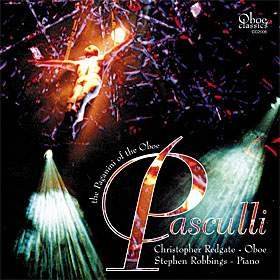Question: who invented circular breathing? Now,
my eldest son, who plays the didgeridoo, tells me that it must
have been the ancient aborigines as the only way to keep the long
pedal notes going in their music is through this method. Well,
Christopher Redgate, the star oboeist on this disc, in his excellent
programme notes to this CD, wonders if it was Antonino Pasculli.
Perhaps he was the first to expect oboists to play a continuous
stretch of semiquavers without a break for four minutes on end.
He was certainly only one of a number of oboe virtuosi during
the 19th Century (look up Casimir Lalliet 1837-92 or
Stanislas Verroust 1814-63) although he was probably the most
extraordinary,
Curiously, his career was short-lived due to
failing eye-sight in early middle age. He appears not to have
had any music written for him. It seems that the pieces recorded
here were for himself to play and therefore mostly date from the
1870s and 1880s. They consist of Fantasias and three movement
concertos using themes from some of the popular Italian operas
then in vogue, some now almost completely forgotten. They are
nicely composed and allow much opportunity for the performer to
show lyrical expression as well as agile register-crossing and
lightning-fast fingerwork. All of this is superbly handled by
Christopher Redgate who can often be found in avant-garde repertoire
where virtuosity of musicianship as well as technicality is vital.
Pasculli is describe by Redgate as ‘the Paganini
of the oboe’. Sadly he was not such a comparably talented composer
and I must say that for me these works had to be taken one at
a time as I soon wearied of them. However they each push virtuosity
on the instrument to a spectacular level and Redgate negotiates
everything with immaculate aplomb.
The CD starts (and it would surely have been
better placed in the middle of the recital) with ‘The Bees’. This
is a four minute non-stop romp which is quite unlike anything
I’ve ever heard before. I would almost say that it is the most
difficult oboe piece ever composed. However having recently heard
music by and composed for Heinz Holliger I am probably wrong but
perhaps not so very far off the mark. It is this piece that demands
circular breathing but it also this piece which demanded a better
recording. The boxy sound and the lack of dynamic contrast which
seems to result makes me feel somewhat relieved when it is over.
I feel particular sorry for Stephen Robbings whose assured and
sensitive accompanying is a little lost by poor microphoning.
The ‘Fantasias’ fall into four or five movements
each separately tracked but played without a break. Each contains
several themes contrasted in speed and key. The concertos (were
they ever orchestrated?) are more classical generally consisting
of a portentous piano introduction leading to an Allegro. Then
comes a slower middle movement which, in the case of the Donizetti
‘La Favorita’, is a theme and variations. There is an Allegro
finale but again with a slow introduction led by the piano. Normally
each concerto has two complex and virtuoso cadenzas which are
by Pasculli himself.
Don’t be put off by the horridly gaudy cover
which seems to have amongst its neon lights a crucified Christ
(!) because this is an incredible CD for everyone who enjoys brilliant
performers and performances. Not however for listeners who prefer
profound music.
Gary Higginson
